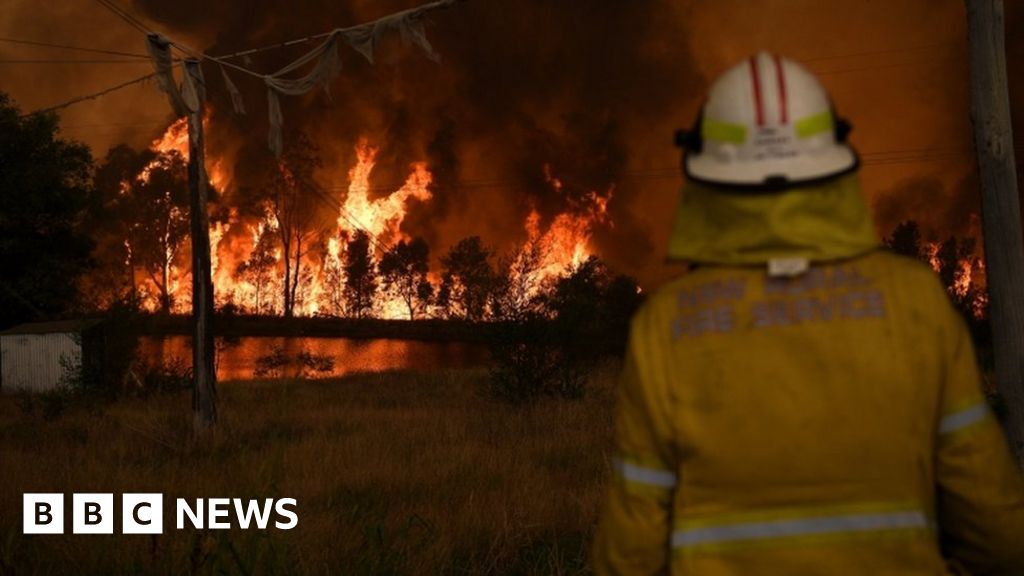Australia fires: Travel warnings issued over 'catastrophic' blazes - 5 minutes read
 Australia fires: Travel warnings issued over 'catastrophic' conditions
Australia fires: Travel warnings issued over 'catastrophic' conditionsCatastrophic fire warnings are in place across the Australian state of New South Wales (NSW), where firefighters are tackling more than 100 blazes.
Authorities have urged Christmas travellers to delay their journeys as conditions threaten to intensify the bushfire crisis.
Rising temperatures and strong winds have worsened fires in three states.
Three blazes around Sydney are burning at emergency level, the second highest level of danger after catastrophic.
"We are asking everybody not to travel on roads anywhere near the vicinity of an active fire unless you absolutely have to," Gladys Berejiklian, premier of NSW, said at a news conference.
A combination of temperatures above 40C, low humidity and strong winds have worsened the struggle for the almost 10,000 emergency personnel mobilised to deal with the bushfires in NSW.
"We are in a period of unbelievable drought and some areas haven't seen rain for more than 12 months", NSW Rural Fire Services Inspector Ben Shepherd told the BBC.
"These fires are likely to continue to spread well past Christmas", he added.
Two volunteer firefighters died on Thursday as they were tackling a large blaze near Sydney. Fires have also been ravaging the states of Victoria and South Australia, where two civilians died on Friday.
Since September, Australia's bushfire emergency has killed eight people, destroyed more than 700 houses and scorched millions of hectares.
The states of NSW and and South Australia are the focus of the travel warnings.
In NSW, several major roads and highways have been closed, including a section of the Princes Highway.
As of 16:30 (05:12 GMT), 24 roads and highways in NSW were affected by fire, according to a government website.
Roads have been closed in South Australia as well, with residents asked to monitor the government traffic website for updates.
"If members of the public attempt to enter the areas, they will be turned away, regardless of being property owners or business owners, due to specific safety reasons," a police official said.
Tributes have been paid to firefighters Geoffrey Keaton, 32, and Andrew O'Dwyer, 36, who died when their truck was hit by a falling tree near a fire front, causing it to roll off the road.
Three other firefighters who were also in the vehicle survived with minor injuries.
NSW fire commissioner Shane Fitzsimmons said firefighters everywhere were grieving over the "huge loss" of the two young fathers, who were caught up in "the worst imaginable set of circumstances".
"[They] simply went out, doing a remarkable job, like all their colleagues, and like they have done year-in, year-out, and to not be coming home after their shift is a tremendous grief," he said.
South Australian Premier Steven Marshall said a person had been killed in Murraylands, when the car they were driving hit a tree. Another person died in the Charleston area of the Adelaide Hills, authorities said.
Many Australians have accused Prime Minister Scott Morrison's government of inaction on climate change.
Last year, the UN reported that Australia was not on track to meet its commitments under the Paris Agreement - the global deal to tackle rising global temperatures.
Mr Morrison has faced criticism for going on holiday despite the severity of the bushfires.
Firefighters' union leader Leighton Drury said Australia was "seeing an absolute lack of leadership from this government and it is a disgrace".
Criticism grew as a heatwave broke records across the country and exacerbated mammoth blazes, making the task even harder for exhausted firefighters - many of them volunteers.
In a statement, Mr Morrison apologised and said he would be "returning to Sydney as soon as can be arranged".
Meanwhile, acting Prime Minister Michael McCormack has acknowledged that further action must be taken to combat climate change but said there was "a lot of hysteria" surrounding the issue.
"Climate change is not the only factor that has caused these fires. There has been dry lightning strikes, there has been self-combusting piles of manure, there has been a lot of arsonists out there causing fire", he said.
Although climate change is not the direct cause of bushfires, scientists have long warned that a hotter, drier climate would contribute to Australia's fires becoming more frequent and more intense.
Are you in the affected region? If it is safe to do so, email haveyoursay.co.uk.
Please include a contact number if you are willing to speak to a BBC journalist. You can also contact us in the following ways:
Source: BBC News
Powered by NewsAPI.org
Keywords:
Australia • Wildfire • New South Wales • Bushfires in Australia • Sydney • Gladys Berejiklian • Humidity • Bushfires in Australia • Drought • Fire department • Ben Shepherd • BBC • Christmas • Fire • Sydney • Victoria (Australia) • South Australia • Bushfires in Australia • South Australia • Princes Highway • Greenwich Mean Time • New South Wales • South Australia • Property • Firefighter • Truck • Shane Fitzsimmons • Young Fathers • Coming Home (Diddy – Dirty Money song) • Steven Marshall • Murraylands • Adelaide Hills • Prime minister • Scott Morrison • Climate change • Australia • Paris Agreement • Australia • Heat wave • Mammoth • Sydney • Michael McCormack (Australian politician) • Climate change • Hysteria • Global warming • Dry thunderstorm • Lightning • Combustion • Manure • Arson • Fire • Climate change • Wildfire • Australia • BBC •